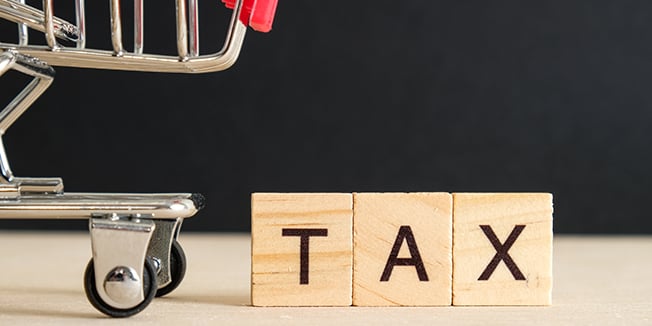
Under a new provision that was recently added to the New York State Tax Law, a marketplace seller is relieved from liability for the collection of New York State sales tax when it receives Form ST-150, Marketplace Provider Certificate of Collection, from a marketplace provider. This new form certifies that the marketplace provider is registered with New York State and will collect New York State sales tax on sales it facilitates for marketplace sellers.
A marketplace seller is also relieved from liability when the marketplace provider has a publicly available agreement which includes the following (or similar) statement:
[Marketplace provider name] is a registered New York State sales tax vendor and will collect sales tax on all taxable sales of tangible personal property that it facilitates for delivery to a New York State address.
New York State Economic Nexus Laws
Following the 2018 Supreme Court decision in South Dakota v. Wayfair, Inc., states have enacted new economic nexus laws or have begun enforcing their existing laws. For example, New York State’s pre-existing economic nexus law is now being enforced.
Many states followed South Dakota’s law by enacting a $100,000 sales or 200 transaction threshold. States are now changing to a sales-only economic nexus threshold.
A remote seller with no physical presence in New York State must register and collect New York State sales tax when they have more than $300,000 in sales of tangible personal property delivered in New York, and makes more than 100 sales of tangible personal property delivered in New York during the previous four sales tax quarters. The sales tax quarters in New York are: March 1 through May 31, June 1 through August 31, September 1 through November 30, and December 1 through February 28/29.
Additional information on the economic nexus provisions is available on the Department of Taxation and Finance’s website.
New York State Marketplace Facilitator Laws
To facilitate the collection of sales tax from out-of-state sellers with no in-state physical presence, states are enacting “marketplace facilitator” laws. A marketplace facilitator is a company such as Amazon, which provides a “marketplace,” such as a web site, catalog, shop, store, etc., where goods are offered for sale, and the marketplace facilitator collects payment from customers. It is easier for states to enforce their sales tax laws on a few marketplace facilitators like Amazon than from the customers they serve.
Marketplace facilitators may be required to register themselves and their customers with the state. For example, Kentucky requires marketplace providers to register their customers. As a result, remote sellers may be contacted by the state once they have been identified. States often issue nexus questionnaires to determine exposure to state income, franchise, and sales tax for prior years.
New York State’s Marketplace Provider Law
New York State’s marketplace provider law is effective for sales of tangible personal property made on or after June 1, 2019. Under this law, a marketplace provider is required to collect and remit New York State sales tax on all taxable sales of tangible personal property that it facilitates for its customers when the marketplace provider agrees to collect payment from in-state customers.
Highlights of New York State’s marketplace provider law are as follows:
- A marketplace provider must issue Form ST-150 to its marketplace sellers for sales of tangible personal property it facilitates for such sellers. Alternatively, this form is not required when the marketplace provider has a publicly-available agreement that includes the statement discussed above.
- A marketplace provider is relieved of liability for failure to collect the correct amount of tax to the extent the marketplace provider can show that the error was due to incorrect or insufficient information given to the marketplace provider by the marketplace seller.
- A marketplace provider is not required to collect and remit New York State sales tax on services, restaurant food, hotel occupancy, or admissions to a place of amusement. The marketplace seller is responsible to collect and remit sales tax.
In addition, a marketplace seller is relieved from liability for sales tax collection on sales of tangible personal property and should not include such receipts in taxable receipts. However, a marketplace seller is not relieved of liability for sales of services and sales not made through a marketplace provider.
New York State Technical Memorandum TSB-M-19(2)S (May 31, 2019) provides further information regarding New York State sales tax collection requirements for marketplace providers.
State Sales Tax Nexus Reviews More Important Than Ever
 Marketplace sellers should continue to assess their sales tax nexus footprint in each state through state sales tax nexus reviews. Sales made through marketplace providers are generally included in determining whether in-state sales exceed economic nexus thresholds, which may require sellers to register with the state. The seller is then responsible for sales tax collection for sales of services and tangible personal property not made through marketplace providers, or to collect exemption forms from customers for exempt sales. Nexus reviews are equally important for income, franchise and other state and local tax purposes.
Marketplace sellers should continue to assess their sales tax nexus footprint in each state through state sales tax nexus reviews. Sales made through marketplace providers are generally included in determining whether in-state sales exceed economic nexus thresholds, which may require sellers to register with the state. The seller is then responsible for sales tax collection for sales of services and tangible personal property not made through marketplace providers, or to collect exemption forms from customers for exempt sales. Nexus reviews are equally important for income, franchise and other state and local tax purposes.
For more information on New York State and other states marketplace seller laws, or to talk with a member of our state and local tax team about a nexus study, please contact Freed Maxick.
